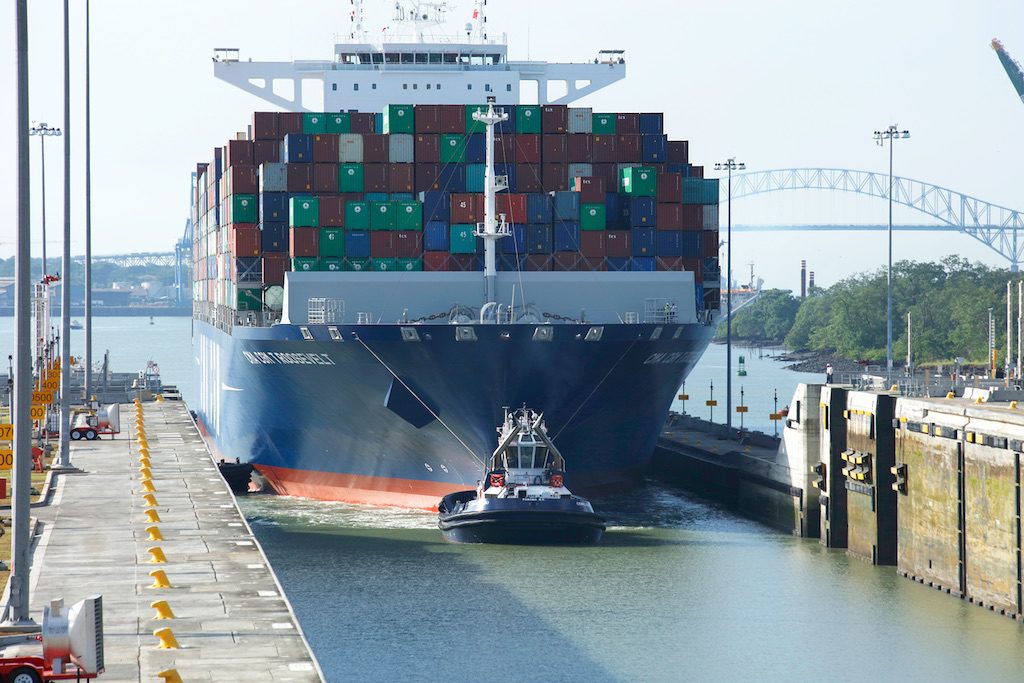Global Crude in Transit Reaches Record 1.24 Billion Barrels as Supply Surges
A flotilla of crude oil on the world’s oceans expanded to a fresh high as producer nations keep adding barrels and the tankers sail further for deliveries.

Here you can see the split line configuration used by a tugboat maneuvering a ship through the Expanded Panama Canal’s Neopanamax locks. Photo: Panama Canal Authority
Panama Canal tugboat captains are locked in a heated dispute with the Panama Canal Authority (ACP) regarding the authority manning and safe operation of tugboats in the new Neopanamax locks after the authority unilaterally and without warning reduced the number of deckhands available to the tugs.
The ACP is the agency of the Panamanian government that is responsible for the operation and management of the Panama Canal, a major economic driver for the country.
The dispute escalated in recent days since the ACP announced sanctions against some tugboat captains who the ACP accused of interrupting the performance of the Canal and causing economic loss by refusing to transit vessels on April 12.
The union representing the tugboat captains, UCOC Panama, has denied the ACP’s accusations of purposefully interrupting transits and maintains that any actions taken by their captains were based solely on their duty to maintain the security of ships in canal waters.
We spoke to a representative from the UCOC who described what is behind the dispute.
Unlike the Canal’s original locks, which use “mules” to maneuver ships through, the new Neopanamax locks require two tugboats, one forward and aft, that connect to transiting ships using a “split line” configuration. We are told the safest way to do this is by having three deckhands on the tugboats, particularly on the forward one which is most at risk while inside the locks.
According to the UCOC spokesperson, beginning at midnight on April 12, Panama Canal management unexpectedly refused to the provide the third deckhand for the forward tugboat, as has been the standard since the Expanded Panama Canal opened, and no explanation was provided for the change of procedure.
“The unconsulted and sudden decision of the Panama Canal Administration to eliminate a tugboat sailor from the bow, endangers the safety of customers, workers and the Canal’s own facilities,” the UCOC said in a statement over the weekend.
“It is false that the tugboat captains refuse to do their job; the events of the last 48 hours are due to discrepancies in issues that specifically affect the safety of navigation and the operation of the Panama Canal,” the statement added.
The UCOC cited an incident last November in which a deckhand was killed on a tugboat connected to the stern transiting vessel. Despite starting operations with three sailors, the aft tugs now only use two sailors, which the union believes may have contributed to the incident. “We do not want history to repeat itself,” the UCOC said.
On Tuesday, ACP Deputy Administrator Manuel Benítez took to Panamanian radio to defend the move to two deckhands and publicly blame the tugboat captains for interrupting canal operations.
“No one has the right to stop the traffic in the channel, because we have an authority structure where it is established that the work is done and then one complains. The channel is required to operate with discipline,” said Mr. Benítez, who also revealed that the April 12 stoppage impacted the transit 8 ships.
The ACP further defended its actions in a statement provided to gCaptain. It reads, in part:
The Panama Canal has normalized transits through its Neopanamax locks following a brief and isolated service interruption that occurred on April 12 when several tugboat captains refused to comply with mandatory procedures, endangering the Canal’s performance and causing economic loss…
…The Panama Canal is constitutionally mandated to ensure the waterway’s uninterrupted operation and has therefore taken steps to determine the necessary measures to discipline those responsible, as is required by Panamanian regulations.
We are told that, so far, at least one tugboat captain has received a letter of separation from the ACP, but the ACP has threatened further action against as many as 22 tugboat captains, according to the UCOC representative we spoke to.
“The sanctions imposed on April 12 removed those responsible for the incident from their functions,” a spokesperson for the ACP told gCaptain.”The Panama Canal Administration has started to officially investigate the group of tugboat captains that refused to comply with this decision as to their motivations for non-compliance.”
On Wednesday, the UCOC, which has accused the ACP of trying to privatize tugboat operations, said a mediation meeting with the ACP to try and resolve the dispute had failed to bring about any reasonable path forward.
The ACP has denied claims accusations that it is trying to privatize tugboat operations.
The Expanded Panama Canal opened larger vessels in June 2016. Since then, more than 3,000 vessels have made the transit through the new locks, far exceeding the initial traffic estimates for the waterway.
The operations of the existing Panamax locks have not been affected by the dispute. As of now, both the Panamax and Neopanamax locks operate as normal.

Sign up for gCaptain’s newsletter and never miss an update

Subscribe to gCaptain Daily and stay informed with the latest global maritime and offshore news
Essential news coupled with the finest maritime content sourced from across the globe.
Sign Up